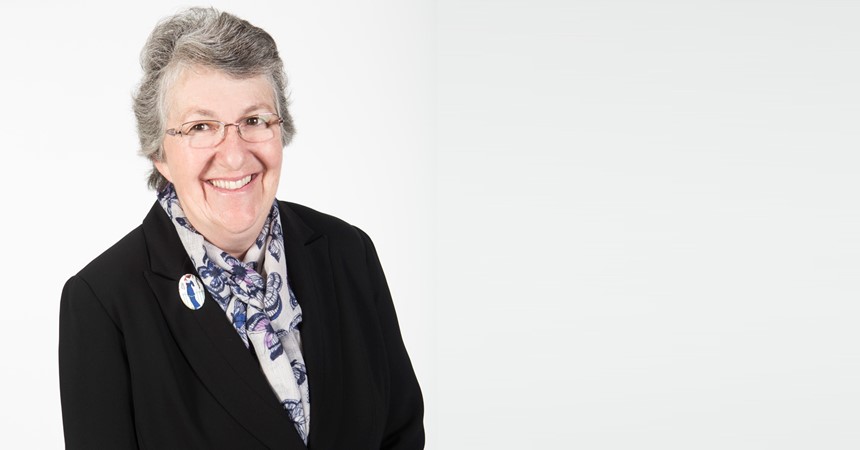However, before doing so, I would like to share with you two stories which I happened to come across on Sunday morning. One was while reading the Newcastle Herald’s Weekender, and the other was while listening to Macca on ABC Sunday radio on my way to the 9.30am Mass at the Cathedral.
 Scott Bevan wrote an article “Seeing What’s Possible” in this week’s Newcastle Herald’s Weekender. He wrote about John Fawcett, a local man who had relocated to Bali after some major health issues. It was in Bali that John regained health and he felt he had been given a new life. He wanted to give, to as many others as he could, the same opportunity at a second chance of life, as had been given to him. He established a cataract mobile clinic and since 1991 about 50,000 Balinese people have had their sight restored through the John Fawcett Foundation. He also set up a corrective surgery program for those with a cleft lip or cleft palate. Scott Bevan writes:
Scott Bevan wrote an article “Seeing What’s Possible” in this week’s Newcastle Herald’s Weekender. He wrote about John Fawcett, a local man who had relocated to Bali after some major health issues. It was in Bali that John regained health and he felt he had been given a new life. He wanted to give, to as many others as he could, the same opportunity at a second chance of life, as had been given to him. He established a cataract mobile clinic and since 1991 about 50,000 Balinese people have had their sight restored through the John Fawcett Foundation. He also set up a corrective surgery program for those with a cleft lip or cleft palate. Scott Bevan writes:
"John died last month in Perth. He was 85. When I heard the news, I thought about who and what the world had lost. The Balinese have lost their beloved “Mr John”. Australians have lost a gentle unofficial diplomat, who brought our neighbour closer in profound ways. I have lost a mentor. John had opened my eyes to so many things, including elements of myself.
A service for John is being held in Bali next week. The Island of the Gods will be weeping. Now John’s eyes are closed, but about 50,000 windows to his soul remain open. For his vision lives on, through the lives of all those former patients.
And he remains a towering example of how to make the most of life. I remember what he said to me once as we sat under  a full moon in Sanur: “Things happen in life that make you feel’ that’s got to be the end’. But it’s not. No one can take away the happy memories of what has been, but it doesn’t mean you don’t open the door and step through to what is next.”
a full moon in Sanur: “Things happen in life that make you feel’ that’s got to be the end’. But it’s not. No one can take away the happy memories of what has been, but it doesn’t mean you don’t open the door and step through to what is next.”
Macca, on ABC radio, interviewed Ambre Hammond, an Australian classical pianist. What an amazing talented and generous lady. She is the founder and presenter of the Girl Piano Truck which is a worldwide project involving travel with a piano or keyboard, 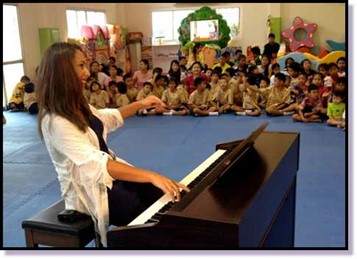 giving concerts in schools and orphanages in underprivileged and remote areas around the globe. She has performed in remote areas of India, East Timor, Thailand, Belarus, Philippines, and this week will head off to Tanzania. She takes her piano to parts of the world that have never been exposed to a piano or its beautiful musical sounds that she is able to create. She spoke to Macca about giving back, particularly to those who are disadvantaged. Clearly she gives generously and receives graciously.
giving concerts in schools and orphanages in underprivileged and remote areas around the globe. She has performed in remote areas of India, East Timor, Thailand, Belarus, Philippines, and this week will head off to Tanzania. She takes her piano to parts of the world that have never been exposed to a piano or its beautiful musical sounds that she is able to create. She spoke to Macca about giving back, particularly to those who are disadvantaged. Clearly she gives generously and receives graciously.
I felt inspired to share both of these good news stories with you because it is easy to get stuck in the negative media cycle and to be overwhelmed by a world ‘gone mad’. I thought these two stories set the context for a busy week in our diocesan church and community. We are an image of a good, generous and gracious God.
A week ago the members of the Three Diocesan Ecumenical Commissions met with their bishops to discuss the Tri Diocesan Covenant which has its 10-year anniversary next year. Bishops Peter Stuart (Newcastle Anglican Diocese), Bill Wright (our bishop) and Peter Comensoli (Broken Bay Diocese) engaged with each other around what our ecumenical relationships have been and might continue to be. Each of the contexts for the three dioceses are quite unique and yet there is a real desire to honour the covenant of these three dioceses. We spoke of the ecumenism of faith, action and fellowship and the covenant as a critical symbol of our faith and connection, not only for each of our communities but for the wider community.
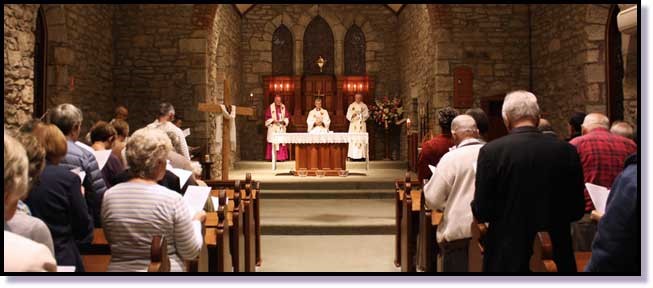
On Monday night, I attended the Diocesan Council of Ministry with Young People (DCMYP), Pints with a Purpose, in which the speaker, Professor Michael Hazelton, from the University of Newcastle, spoke about Mental Health and Social Justice. He made reference to global mental health being a failure to humanity and a global tragedy. He engaged those present in a conversation about mental health and primary care. This was followed on Tuesday, World Mental Health Day, with a community mental health  forum, with the theme Share the Journey. Our Social Justice Council, along with CatholicCare, co-ordinates this event each year. Once again, members of the Under Construction Choir were present and provided the entertainment. This community choir values the role of singing for wellbeing as well as the social connectedness with each other and with those they entertain. One of the members spoke of the good hormone, serotonin, produced when one sings, sings in a choir and is applauded by an audience. We also heard from a carer, who stressed the importance of the need to keep on caring, even when it gets really tough. I certainly took away the importance of exercise, diet, social connection and mindfulness as essential elements in maintaining good health and wellbeing.
forum, with the theme Share the Journey. Our Social Justice Council, along with CatholicCare, co-ordinates this event each year. Once again, members of the Under Construction Choir were present and provided the entertainment. This community choir values the role of singing for wellbeing as well as the social connectedness with each other and with those they entertain. One of the members spoke of the good hormone, serotonin, produced when one sings, sings in a choir and is applauded by an audience. We also heard from a carer, who stressed the importance of the need to keep on caring, even when it gets really tough. I certainly took away the importance of exercise, diet, social connection and mindfulness as essential elements in maintaining good health and wellbeing.
On Tuesday evening about sixty people gathered with Bishop Bill and Bishop Peter Stuart (Anglican Bishop of Newcastle) for the Two Bishops’ Dialogue which forms part of the Tri Diocesan Covenant. The topic for this year’s dialogue was “Morals, Ethics and Good Decisions”. Both Bishops referred to Richard Hooker’s Three Legged Stool of Scripture, Reason and Tradition in ethical moral decision-making, but 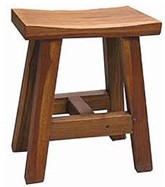 added the fourth leg of Experience. These four elements form a framework and shape the way we think about God and wrestle with the issues of our time. Bishop Bill also went on to speak about conscience, following his article in October’s edition of Aurora. If you have not seen this, it is definitely worth the read and can be found here: http://mnnews.today/aurora-magazine/october-2017/23617-a-case-of-conscience/. There are so many areas of our personal and communal lives that are impacted upon by the decisions we make – war, refugees, the environment, economic matters, Aboriginal issues, the poor, housing, wages, consumerism, sexual ethics, medical ethics… One of the key questions that arises is, “What makes for a decent, orderly, peaceful society?” and then “How might or should we respond?” It is not about achieving perfection but about our personal and collective growth.
added the fourth leg of Experience. These four elements form a framework and shape the way we think about God and wrestle with the issues of our time. Bishop Bill also went on to speak about conscience, following his article in October’s edition of Aurora. If you have not seen this, it is definitely worth the read and can be found here: http://mnnews.today/aurora-magazine/october-2017/23617-a-case-of-conscience/. There are so many areas of our personal and communal lives that are impacted upon by the decisions we make – war, refugees, the environment, economic matters, Aboriginal issues, the poor, housing, wages, consumerism, sexual ethics, medical ethics… One of the key questions that arises is, “What makes for a decent, orderly, peaceful society?” and then “How might or should we respond?” It is not about achieving perfection but about our personal and collective growth.
This was then followed by the annual Pastoral Ministers dinner with Bishop Bill on Wednesday evening, when those who are engaged to work in the area of pastoral ministries in parishes and chaplaincies gather to enjoy each other’s company while sharing a meal and supporting each other. It really is about forming relationships because many work in isolation from each other and Bishop Bill. It is always an enjoyable evening with good food and company.
On Thursday, a process of assessing and developing a model of discernment for the diocese was put to the ‘test’ with a small group of people. The Diocesan Pastoral Council is keen for a discernment process to be developed for use across the diocese, especially when we begin to prepare for a possible diocesan Synod or the 2020 Australian Plenary Council. This discernment process requires everyone to participate in deep respectful listening, and to listen to and respond to God through prayer and contemplation. It really is a way of life with skills that require practice and patience. I am sure you will hear more about this over the coming months.
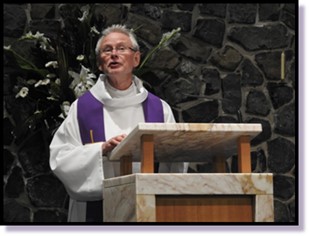 On Friday night, I attended the Healing Service, celebrated by Fr Richard Shortall sj, at Corpus Christi, Waratah. Fr Richard has been at Waratah conducting his Prayer in Everyday Life Retreat for the past three weeks. About fifty parishioners gathered and shared supper afterwards, ever grateful for the richness of Fr Richard’s presence among them. Fr Richard continues to be one of Pope Francis’ Missionaries of Mercy and remains living in the motor home. He has now moved to Wallsend-Shortland Parish where he will run another three-week retreat before returning home to Melbourne.
On Friday night, I attended the Healing Service, celebrated by Fr Richard Shortall sj, at Corpus Christi, Waratah. Fr Richard has been at Waratah conducting his Prayer in Everyday Life Retreat for the past three weeks. About fifty parishioners gathered and shared supper afterwards, ever grateful for the richness of Fr Richard’s presence among them. Fr Richard continues to be one of Pope Francis’ Missionaries of Mercy and remains living in the motor home. He has now moved to Wallsend-Shortland Parish where he will run another three-week retreat before returning home to Melbourne.
On Saturday, I met with the members of the DCMYP as we discussed their many activities as well as planning for the Year of Youth which will take place from the beginning of December. At this stage it looks like about 200 people from our diocese will attend the Australian Catholic Youth Festival.
Then on Sunday, a number of people gathered at the Cathedral to witness Solomon Okovido’s installation as an Acolyte by Bishop Bill. This was indeed a celebration. Solomon has been in the diocese for almost one year and is making this his home. I ask that all of you pray and support Solomon as he discerns God’s call for him.
I then drove to Scone to attend the Upper Hunter Regional Pastoral Council meeting. I have spoken before about the benefits of a region coming together with a common purpose. It was the strong desire of the 1992/93 Diocesan Synod and Diocesan Pastoral Plan that parishes would come together for the purposes of pastoral planning, so as to give people a real sense of belonging to the wider Church. At these meetings, those present share ideas and seek out ways of being church in the broader Upper Hunter context. They struggle, but they believe in still meeting, even after 25 years, because they know the Spirit is at work in and through them. It is good to be with them and to explore with them what is possible.
So if anyone asks if we are still actively engaged as a community of followers of Jesus Christ, I think you can respond in the affirmative. I hope this gives you heart to realise that many are actively engaged and involved in the various aspects of diocesan, local and community life.
